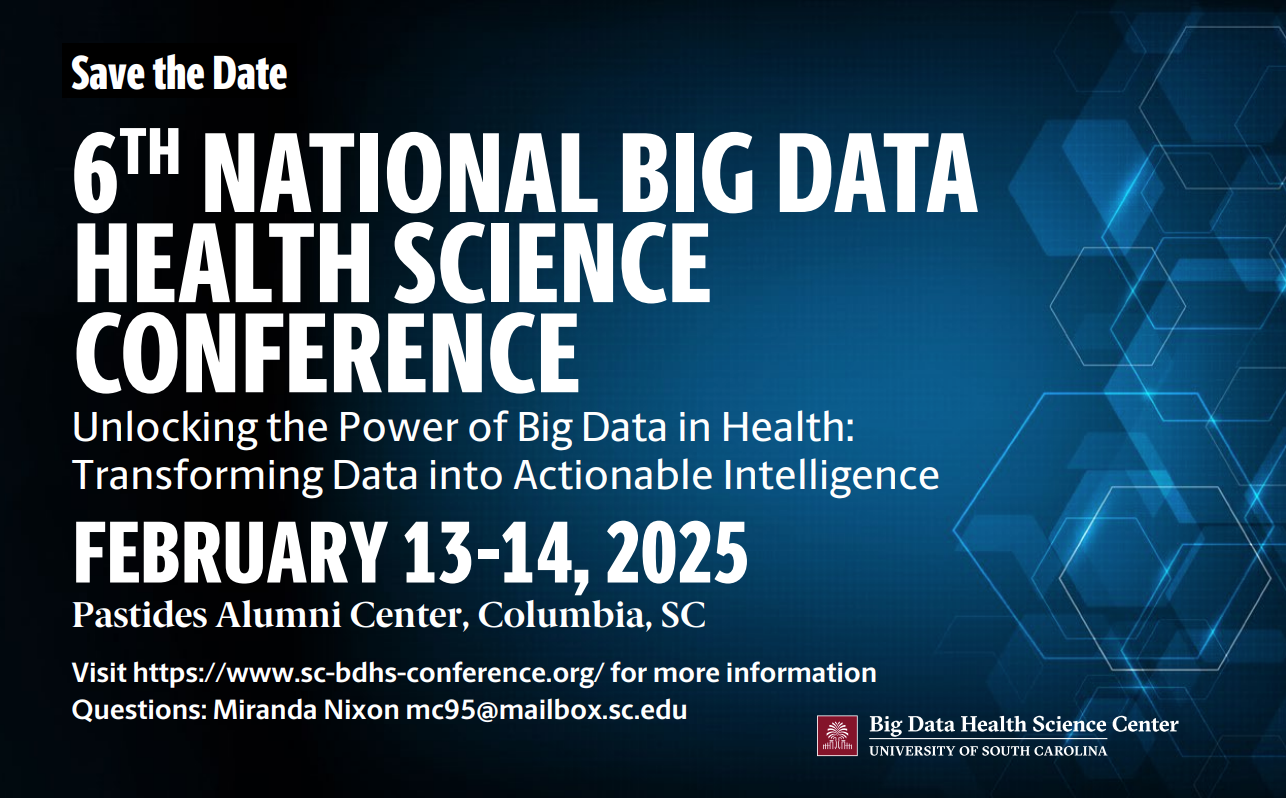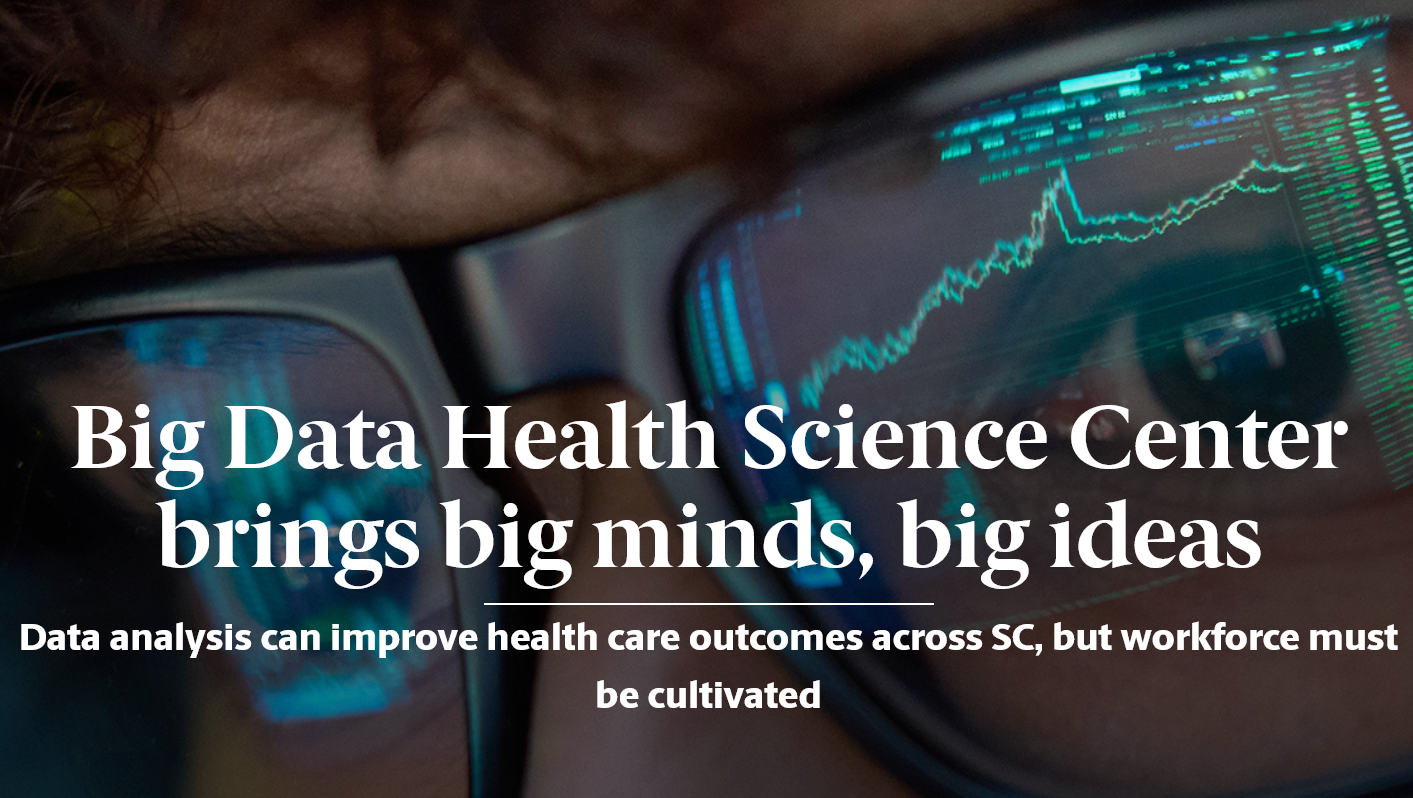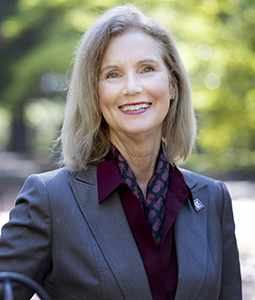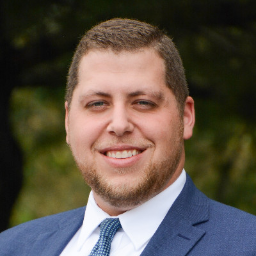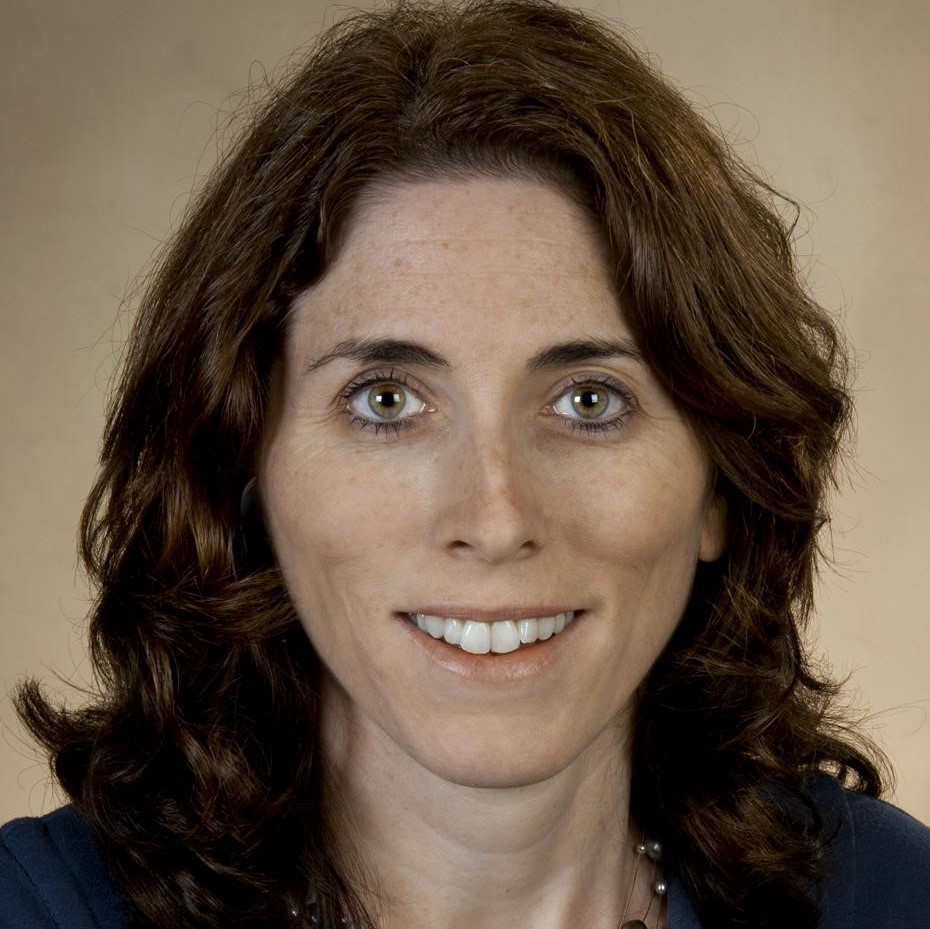Big Data Health Science Center
The University of South Carolina Big Data Health Science Center (BDHSC), a USC Excellence Initiative, serves as a campus-wide interdisciplinary enterprise that conducts cutting-edge research and discovery, offers professional development and academic training, and provides service to the community and industry.
Save the Date: 6th National Big Data Health Science Conference
The National Big Data Health Science Conference is a signature annual event of the USC Big Data Health Science Center (BDHSC). The theme of the 2025 conference is “Unlocking the Power of Big Data in Health: Transforming Data into Actionable Intelligence.” Highlights of the 6th national conference will include keynote and panel speakers from diverse areas of the health sciences, government, and academia, as well as poster sessions, networking events, and breakout sessions in areas of artificial intelligence for sensing and diagnosis, electronic health records, genomics, geospatial, and social media research. Funding for this conference was made possible (in part) by R13LM014347 from the National Library of Medicine.
The Next Generation of Big Data Health Scientists: 2024 R25 Big Data Health Science Faculty Fellows
We’re excited to announce the 2024 R25 Fellows who will join the NIAID-funded R25 Big Data Health Science Fellow Program. As part of the BDHSC’s professional development mission, the Big Data Fellow program is designed to address these gaps and promote big data health science research at USC. Representing three different academic colleges/schools, the 2024 fellows include Pieter Baker (Assistant Professor of Epidemiology and Biostatistics), Hui Chen (Assistant Professor of Biological Sciences), Lelia Larson (Assistant Professor of Health Promotion, Education, and Behavior), Parthenia Luke (Research Assistant Professor, College of Social Work), Yuan Wang (Assistant Professor of Epidemiology and Biostatistics), and Yanfeng Xu (Assistant Professor, College of Social Work). Since 2021, a total of 20 junior faculty fellows have joined the Big Data Health Science Fellow Program. Learn more about our fellows, their mentors, and their proposed research.
Big Data Health Science Center Brings Big Minds, Big Ideas
The human body is so complex that it’s estimated every person generates two terabytes of data every day. If health care experts could gather and study that data, they could pinpoint ways for people and communities to be healthier. The biggest problem — two terabytes per person is too much data. Because data will play such a large role in the future of health care, the University of South Carolina launched the Big Data Health Science Center in 2019. The center held its fifth annual Big Data Health Science Conference in February, which attracted almost 100 presenters from five countries and 269 attendees. This was the first year the conference was partially sponsored by the National Institutes of Health.
Recent News
The BDHSC Welcomes its 2024 Cohort for the Third Annual T35 Summer Research Training Program for Infectious Diseases
The University of South Carolina (USC) Big Data Health Science Center (BDHSC) welcomes the 2024 cohort of its third annual Big Data Health Science Summer Research Training Program for Infectious Diseases. This NIH-funded training program is designed to introduce master’s and pre-dissertation doctoral students to the challenges and excitement of data science research by providing a mentored summer research experience with the aim of inspiring trainees toward academic careers that incorporate biomedical, behavioral, and clinical research. In addition to mentored research and formal classroom training (at no cost to the student), each student will receive funding and travel support to publish and present their research at national and local conferences.
2024 Health Geographic Information Science Scholars
The Big Data Health Science Center (BDHSC) at the University of South Carolina (USC) is pleased to announce the recipients of the 2024 Health Geographic Information Science (GIS) Scholars Program: Morgan Boncyk, a PhD candidate in the Department of Health Promotion, Education, and Behavior at the Arnold School of Public Health, and Bridget Hamilton, a PhD student in the College of Nursing. Since 2021, eight graduate students have received the Health GIS Scholarship in total. The BDHSC is dedicated to offering academic and professional training programs for those who wish to work in the field of big data health science. The Health GIS Scholars Program, started by the BDHSC Geospatial Core, is one of the noteworthy training initiatives supported and run by the BDHSC.
The 5th National Big Data Health Science Student Case Competition Winners Announced!
A team from the University of South Carolina won the $5,000 first place prize in the 5th National Big Data Health Science Student Case Competition, which focused on developing an efficient method to classify unlabeled electroencephalogram (EEG) sleep data and deploying a machine learning model to address chronic sleep disorders. The 5th National Big Data Health Science Case Competition was held virtually on January 26 – 28, 2024. In its fifth year, it has featured 30 teams from 18 universities in the US. The National Big Data Health Science Case Competition has been held by the University of South Carolina Big Data Health Science Center (BDHSC) since 2020. It took place before the BDHSC’s other signature event, the National Annual Big Data Health Science Conference.
Call for Applications | Big Data Health Science Fellow Program
Supported by NIAID (R25AI164581-03), the USC Big Data Health Science Center (BDHSC) has been implementing a Big Data Health Science Fellow (“Big Data Fellow”) program since 2021. The program provides courses for competency and skills development in BDS research, engages fellows in hands-on research and proposal development, and offers rich mentoring experience in BDS research and professional development. The program recruits at least 4 USC junior faculty per year and provide them with salary support (25%) to participate in the training program. Please click to see the call for applications to the 2024–2025 Big Data Health Science Fellow program. Details about program requirements, eligibility, and deadlines can be found in the Request for Applications document. Apply by March 14, 2024.
Now Accepting Applications: Big Data Analytics Emerging Scholar Training Program for URM Undergrads in SC
The University of South Carolina Big Data Health Science Center is now accepting applications for the Big Data Analytics Emerging Scholar Training Program for URM Undergrads in South Carolina (1R25AI172761-01). The training program aims to foster a more diverse research environment at USC and across the state and encourage underrepresented minority undergraduate students to pursue Big Data research in the prevention, treatment, discovery, prediction, and forecasting of HIV, COVID-19, and other infectious, immunologic, and allergic diseases. Please click for full details about the program, including eligibility, application process, FAQ, etc. The application deadline is March 1, 2024.
Save the Date: National Big Data Health Science Student Case Competition 2024
The University of South Carolina (USC) Big Data Health Science Center (BDHSC) will hold the fifth National Big Data Health Science Case Competition virtually on January 26–28, 2024. The competition provides enthusiastic teams of graduate and/or senior undergraduate students with the opportunity to apply their knowledge to the analysis of big datasets in healthcare. Registration for the case competition is now open! Team registrations will be accepted on a first-come, first-served basis until January 16, 2024.
New Program Trains Community Collaborators to Conduct Big Data Health Science Research
Researchers at the Big Data Health Science Center will use their latest grant – a R25 supplement from the National Institutes of Health – to develop a new program for training community members to use data science in their work. The Community Scholar (R25 c-Scholar) Program will provide data science training and mentored, hands-on research experience to four individuals from various community or governmental organizations. The R25 c-Scholar Program will recruit community members interested in learning how to use big data infectious disease research to improve health outcomes in their communities
New Training Program Preps Underrepresented Minority Students for Careers In Health Data Science
The National Institute of Allergy and Infectious Diseases has awarded approximately $1.6 million to Arnold School faculty to launch a training program aimed at preparing underrepresented minority students to pursue careers in health data science. Based out of the USC Big Data Health Science Center, the project will be led by co-director Xiaoming Li (Department of Health Promotion, Education, and Behavior), Electronic Health Records Core lead Jiajia Zhang (Department of Epidemiology and Biostatistics), and co-director Bankole Olatosi (Department of Health Services Policy and Management).
Recent & Upcoming Events
6th National Big Data Health Science Conference 2024
February 13-14, 2025
NSF ACCESS HPC Monthly Workshop on “Machine Learning and Big Data”
July 31 – August 1, 2024
Geospatial Modeling for Disease Vector Surveillance in Brazil and Beyond
April 11, 2024
Deadline for Big Data Health Science Fellow Program
March 14, 2024
Deadline for Big Data Analytics Emerging Scholar Training Program for URM Undergrads in SC
March 1, 2024
5th National Big Data Health Science Conference 2024
February 2-3, 2024

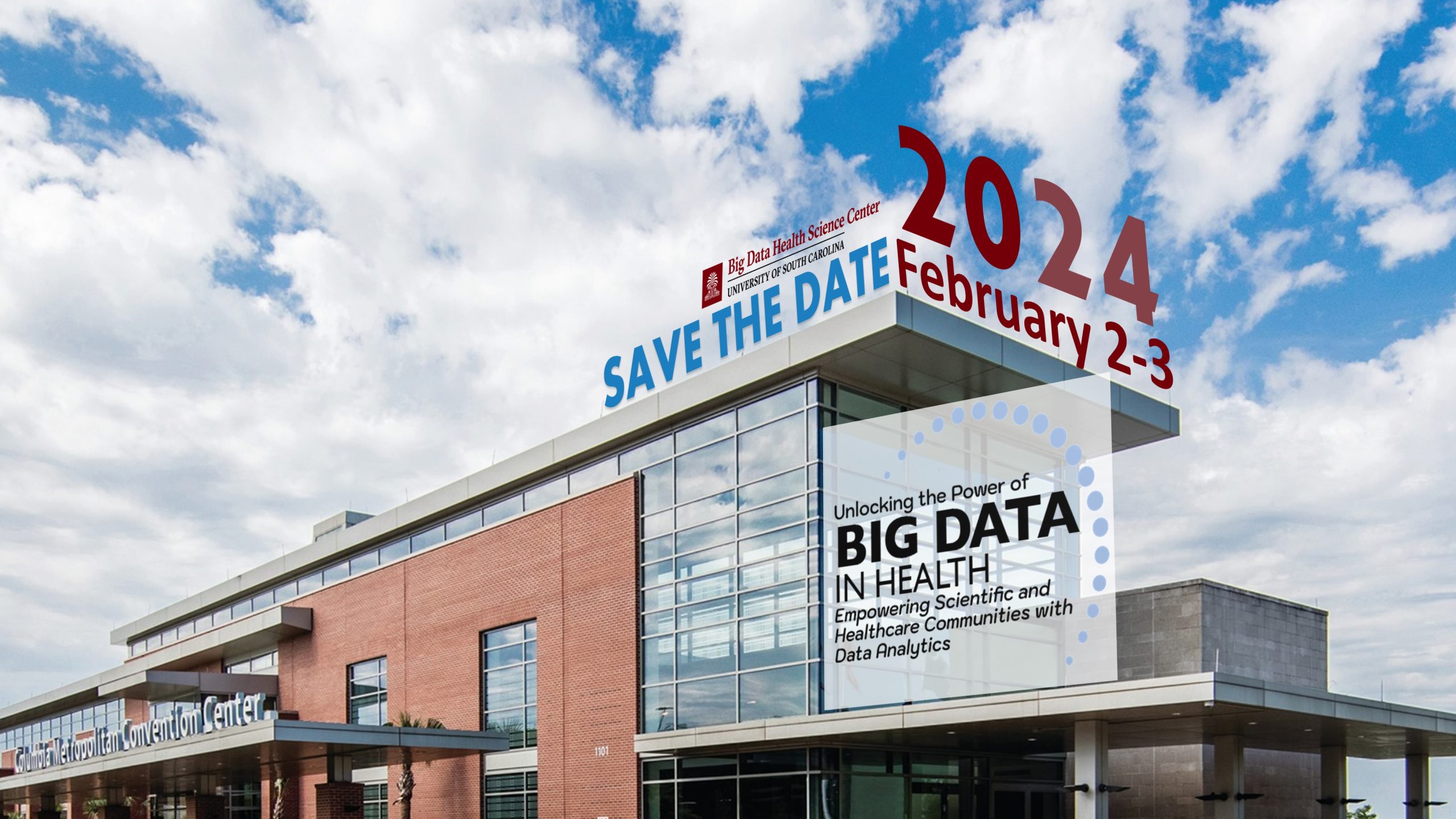
Funding for this conference was made possible (in part) by R13LM014347 from the National Library of Medicine. The views expressed in written conference materials or publications and by speakers and moderators do not necessarily reflect the official policies of the Department of Health and Human Services; nor does mention by trade names, commercial practices, or organizations imply endorsement by the U.S. Government.
The scopes of the projects range from investigating the different ways that COVID-19 impacts people; making better predictions of COVID-19; designing telehealth services and technology innovations for the future; and engaging cutting-edge methods through artificial intelligence, data science, computational methods and statistical modeling.
NIH Grant to Develop Data-driven Strategies in Fighting COVID-19
This two-year grant will support the team’s efforts to develop a database system via REDCap and a mobile application for collating surveillance, clinical, multi-omics and geospatial data on both COVID-19 patients and health workers treating COVID-19 patients in South Carolina.
NSF Award for “Monitoring the Spatial Spread of COVID-19 through the Lens of Human Movement using Big Social Media Data”
Three members of the BDHSC have been awarded $108,717 by the National Science Foundation for their project titled “Monitoring the Spatial Spread of COVID-19 through the Lens of Human Movement using Big Social Media Data.”
Internal COVID-19 Research Grants
The UofSC Office of the Vice President for Research recently announced the recipients of its special internal funding initiative to support COVID-19 research and scholarship. BDHSC is pleased to announce that of the 42 projects funded, BDHSC faculty serve as PI for 10 projects and Co-I for 7 different projects.

